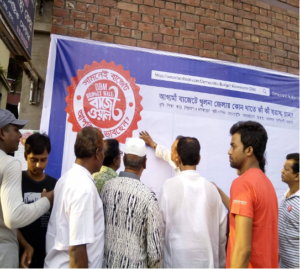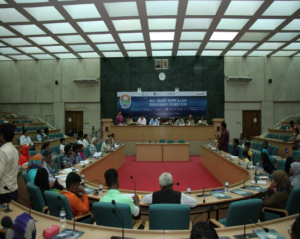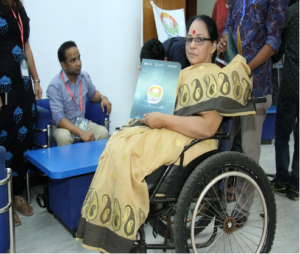Development Partner: The Asia Foundation
Implementing Organization: Safety and Rights Society (SRS)
Project Title: Strengthening citizens’ initiative for participatory budget
Duration of the Project: 5 October 2021 to 4 January 2023 (15 month)
Total Project Budget (BDT): 58, 76, 6001
Background Of the Project
National budget that contains the political vision, policies, plans, strategies and programs of the government and has an all-encompassing effect over citizens’ life and livelihood as-well-as national economy. The existing structure and process of preparing budget of Bangladesh is highly centralized and clearly lacks people’s participation. In-no-way, elected representatives of all strata are involved in budgetary process. Even the Members of the Parliament (MP), constitutionally assigned to approve the Budget are not empowered enough to influence the budget in the Parliament. As-a-result, preparing our national budget has become the exclusive domain of `bureaucratic exercise’. Importantly, lack of public awareness and people’s participation in the budget resulted into corruption and unjust distribution of resources in essential public services that made it utterly non-transparent, un-accountable and non-participatory. Since participation, transparency and accountability are the three major building-blocks of democratic-governance, making national budget a democratic one has become one of the important tasks.
Since 2013, SRS have been working for promoting budget transparency through increasing peoples’ participation in the budgeting process including preparation and implementation of National budget. The current project, which was launched on October 2021 and will continue till December 2022, is the follow-up programme of previous actions. The project was designed targeting a very informal network called “Democratic Budget Movement”- a platform of more than 100 CSO’s in Bangladesh and where SRS is playing a leading role to run this network.
Project Objective:
To improve knowledge and skills of the targeted beneficiaries therefore peoples can raise their voice how and for whom the public money is being spent through various types of development and non-development projects. Peoples’ voice is essential for making the public institutions accountable and transparent.
 Direct beneficiaries: The project targeted 4,150 direct beneficiaries. There are representatives of CSOs of different sectors such as Labour, feminist movement groups, person with disability, Dalit’s, peasants, marginalize groups, slum dwellers, professional groups, trade bodies; Representatives of different media including social, print and electronics; Representatives of youth groups; Member of Parliamentary Caucus; Representatives of local governments; Representatives of different departments under the ministry of Finance and Planning.
Direct beneficiaries: The project targeted 4,150 direct beneficiaries. There are representatives of CSOs of different sectors such as Labour, feminist movement groups, person with disability, Dalit’s, peasants, marginalize groups, slum dwellers, professional groups, trade bodies; Representatives of different media including social, print and electronics; Representatives of youth groups; Member of Parliamentary Caucus; Representatives of local governments; Representatives of different departments under the ministry of Finance and Planning.
Indirect: Tax payers, public service recipients, public servants of selected ministries and parliamentarian in general.
Goal: Promote participatory planning and pro-poor budgeting process.
Outcome-1: People are able to contribute to participatory and democratic budgeting and planning.
Outcome-2: Increased media capacity and public finance management much more effective and efficient.
Outcome-3: Increase transparency and accountability in national budgetary system.
 Major activities:
Major activities:
- Develop knowledge product and training materials for CSOs on planning and budget instruments (made easy, manual/ tutorials etc.):
- Organize ‘budget boot camp’ for CSO leaders and young budget campaigners at national level
- Cascaded training at sub-national/ district level
- Organize colloquium for economic reporters on emerging public finance issues including inclusive budget and progressive taxation
- Awarding fellowship to promote media research/ investigative reporting
- Opinion poll to capture popular budget demand at the national and sub-national level
- Open budget dialogue/ consultation among national and sub-national level policy actors and CSOs to place people’s fiscal demand
- Reactivating parliamentary caucus on planning and budget to promote accountability in the policy formulation process
- Lobby with ministry of planning, finance and other relevant offices
- Budget tracking/citizens monitoring on selected sectors
- Organize people’s parliament on budget at national level to place people’s demand before the policy makers
- Press conference to share people’s opinion and/ or reaction before and post national budget session
 Expected Result and reached people:
Expected Result and reached people:
- Developed knowledge materials like made easy, manual/ tutorials, people are able to contribute to participatory and democratic budgeting and planning. Reach people direct 120 indirect above 1000.
- Through organized ‘budget boot camp’ CSO leaders and young budget campaigners skilled for critical analysis of national and local government budgetary and planning process. Reach people direct 20 indirect above 100.
- CSO’s empowered capable of contributing to making a participatory and democratic budgeting and planning system organized by Cascaded training at sub-national/ district level. Reach people direct 200 indirect above 1000.
- Organize colloquium for economic reporter’s public finance management much more effective and efficient. Reach people direct 30 indirect above 100.
- Through the Awarding fellowship to promote media research/ investigative reporting stimulated media research/investigate reporting and increased media capacity. Reach people direct 10 indirect above 1000.
- Through Opinion poll to capture popular budget demand at the national and sub-national level increasing participation on budgeting and planning system. Reach people direct 400 indirect above 1000.
- Lobby with ministry of planning, finance and other relevant offices to sensitized policy maker.
- Budget tracking/citizens monitoring on selected sectors to increased civic and political space significantly in the domain of budget-making and fiscal governance. Reach people direct 20 indirect above 100.
- Organize people’s parliament on budget at national level to place people’s demand before the policy makers for ensured funds are being utilised with the required level and allocated resources. Reach people direct 200 indirect above 1000.
- Press conference to share people’s opinion and/ or reaction before and post national budget session are Strengthened collaboration between peoples, media & policy maker. Reach people direct 24 indirect above 1000.
Implementing Strategy:
The project will apply the following strategies:
- To co-operate with the Parliamentary Caucus on National Planning and Budget to put forward the budgetary agenda in the National Assembly with specific recommendations supported by appropriate research and consultation.
- Coalition building with the mutual understanding, knowledge and commitment required to ensure public participation and public opinion in the budget process of Bangladesh; In this case, the various existing platforms will be expanded and strengthened so as to motivate the government to formulate a fair and participatory budget with renewed interest and enthusiasm. Collaborate with local government representatives and increase their budget awareness, knowledge and skills.
- Encouraging various media as part of creating public awareness and bringing the importance of budget review to the attention of policy makers.
- Consultation and dialogue with policy makers, concerned ministries, media and CSOs.
- A pool of budget analysts will be formed who will publish budget analysis, observations and reports.
How to meet SDG goal:
Leaving no one behind lies at the heart of the 2030. A clear commitment to inclusiveness is made in the text of the agenda when Member States “pledge that no one will be left behind”. The government of Bangladesh have targets to reach Sustainable Development Goals (SDGs) and its five years plan where inclusiveness is one of the main pillars. To secure the life and livelihoods of underprivileged groups, social safety net programmes are designed and sizeable budget is allocated for every year. There are different types programmes like cash transfer, food security and employment generation, transfer of materials, assistance for special communities, special allowances to different underprivileged sections, support to the new generation in the areas of education, health, training and vocational competence. The main trade off is that these sorts of programmes fail to reach the right recipients due to corruptions and political influences. Here, peoples’ participation is must to avoid the irregularities that are going on.
